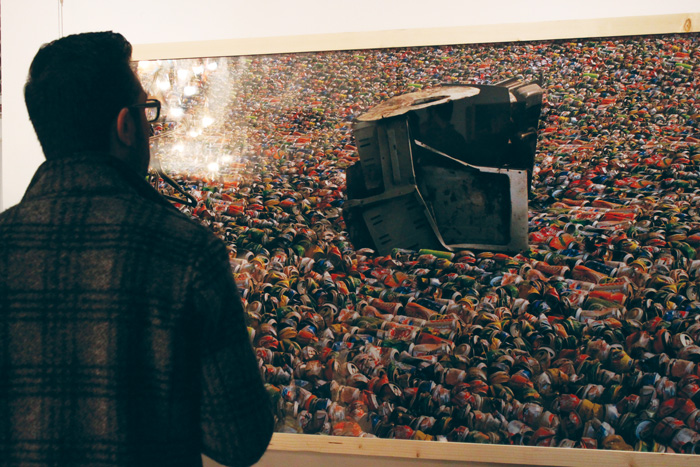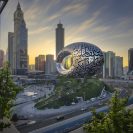By Kingdome Magazine’s Umjay M
I can’t help but be reminded of Louis CK’s skit about polar bears. He argues, “If you believe God gave you this earth, why would you not think you have to look after it?” Referencing our heavy dependence on oil and the irreversible pollution it has created he goes on to ask, “who spilled this? What is that?” The human responds, “it’s oil. It’s just some oil. I didn’t mean to spill it.” “But why’d you take it out of the ground?”. “Because I wanted to go faster. I’m not fast enough.”
Humans are greedy by nature. We want more, we want better, we want faster. While in theory, the want of more and better is not rooted in evil, it’s the want of more for the sake of more that seems to have gotten us where we are today.
“Harmony in the City,” curated by Jasmine Singh and Jassim Al-Nashmi, was exhibited at Masaha 13 during the month of February as a platform which hoped to initiate dialogue on these issues at the global and personal level. The proof is all around us; from environmentally taxing food systems, congested road systems, climate change, the slow withering away of this planet’s resources, you can’t walk two steps without coming face-to-face with the reality of what we’ve done to this earth. While these issues have been deeply explored by many from a wide range of disciplines, “Harmony in the City” addresses you, the inquisitive and empathetic individual at the grassroots level, presenting the synthesis of emerging ideas in search of a post-oil metropolis. These experimental art works, which ranged across performative art, dye-sublimation printing on aluminum and mixed media digital drawing, hoped to raise awareness of where we are today, while exploring possibilities for the future.
One of the many consequences of our hyper-industrialized world is human isolation. Seldom do we now find the need to interact with another human, and because of it, we’ve almost forgotten how to be human. Participating artist Houssam I. Flayhan, a Lebanese Architect who resides and works in Kuwait asks, “can empathy be a tool for change?” With his social media initiative @ekwti, he hopes to prove that empathy is, in fact, the instrument for social change. He compares @ekwti to a virus, which has an incredibly sophisticated mechanism of infecting hosts, integrating its information, thus rapidly spreading through ecosystems. He says, “@ekwti mimics a virus by spreading empathetic knowledge onto followers on social media. This manifestation was propagated on Instagram to encourage and help modify a vision of reality, while developing habits of empathy towards environmental and social issues… in Kuwait.” Followers of the account are informed about local issues and encouraged to take an active part in both understanding the problem and the means by which they might resolve it.
There was a time when you could only eat oranges in winter, strawberries in spring and watermelons in summer. If you think about it, fruit and vegetable seasons were (are) not arbitrary. The cold temperatures of winter take a toll on the immune system, and oranges are nature’s way of replenishing our bodies with vitamin C. In the summer, as the body sweats to keep us cool, it also runs the risk of dehydration – enter the incredibly juicy watermelon. And strawberries, well, strawberries are just delicious. But, when was the last time you took a bite out of a strawberry and not mistaken it for a crunchy Granny Smith apple with a hint of strawberry flavor?
‘The Strawberry Project,’ a comparative analysis of two strawberries consumed in Kuwait, is a digital print work by artists Houssam I. Flayhan, Jasmine Singh and Jassim Al-Nashmi. Through the mapping of the two strawberry routes; one from the industrial berry corporation ‘Driscolls’ in the USA, and the other from ‘Yasmin Farm’ a small local farm in Kuwait, the artists were able to analyze, compare and display the environmental, economic and social equities of the two strawberries. Exploring their journey through the five stages of the food system – production, processing, distribution, access and waste management, ‘The Strawberry Project’ exposed several externalized environmental and social costs that, to the consumer (you and I), seem invisible. In the words of Richard Manning, “every single calorie we eat is backed by at least a calorie of oil, more like ten.”
So, at the risk of sounding cliché, be the change you want to see in the world. The next time you go out, if you pass someone on the street, smile. It’s simple, it’s free and it’s the nice thing to do. If you get the glare of disgust, smile anyway, there is always that one person who’ll get it, and that is where change begins.
Participating Artists: Houssam I. Flayhan, Jasmine Singh, Jassim Al-Nashmi, Roma Madan Soni, Vivan Sundaram. Originally published on www.Kingdome.co. You can follow Kingdome on Facebook and Soundcloud: @KingdomeMagazine, Instagram @Kingdome.co, Twitter @KingdomeCo and on YouTube: Kingdome Magazine.











